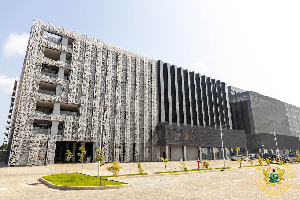In the last of a series looking at technology issues in Ghana, BBC News Online asks whether Africa will ever be able to create a hi-tech hub.
Bangalore's rise to fame as a low-cost centre for US and European technology firms is legendary.
So is the growth of the $120bn industry that makes use of cheap labour in developing nations to carry out basic office functions such as data input.
Tech outsourcing hotspots have sprung up all round the globe, with a myriad of call centres and processing firms setting up shop in the Philippines, Central America and Eastern Europe.
Now Africa is trying to get a slice of the action, as a few select countries battle it out to become the African equivalent of Bangalore.
A reliable power source, good telecom links, a stable government and a suitable labour pool with a strong work ethic are all on the list of must-have qualities.
Good enough
"I could go through country after country in Africa and list those that don't have all the ingredients to make this work," says Frank Schooster, chairman of Global Response, a US firm which runs customer contact centres.
Uganda, Togo, Senegal and Ghana are amongst the countries with small beginnings, with Senegal proving the most popular in the francophone world and Ghana taking the lead, so far, in the English-speaking world.
"I believe that the talent and resources in Ghana are just about the equal of India and not quite up to the level of the Philippines," says Mr Schooster, whose firm is currently setting up a centre in Accra.
"It has a ready available pool of highly skilled labour, not quite so proficient in hi-tech as in India, but certainly worthy and knowledgeable enough to handle basic customer support," he explains.
Latecomers
Accra has already played host to its flagship outsourcing company for three years, watching it grow from just 65 employees to more than 1,300.
Staff at Affiliated Computer Services (ACS) key in health records for US patients by copying hand-written notes taken in dental surgeries, for example.
Not a glamorous or exciting job, admittedly, but it's in an air-conditioned office, pays far and away above the national average and includes ground-breaking benefits such as free medical care.
Now, ACS is building itself a new facility next to the airport and aiming to employ 2,000 staff by the end of next year, making it Ghana's second largest private-sector employer.
"We were very late getting to India," says Jim Charles, when discussing why Ghana was chosen.
The company has a smaller facility in Bangalore where they do more analytical and hi-tech work, turning to Accra's labour pool for the more routine data entry requirements.
Lift-off
Similarly, Paul Turner, a legal adviser at Florida-based Supra Telecom said that he found India was already saturated when his firm scoured the globe for the best place to set up their customer support centre.
One year ago, it acquired a building just behind Accra's High Street, and currently employs 65 people. It aims to expand into a call centre employing 1,000 people by March 2004.
What needs to happen now, says Gregg Pascal Zachary, a research fellow at the International Computer Science Institute, is for one country to grow an existing cluster into a hi-tech hub.
"Ghana needs to build on the firms it has now, achieve a critical mass and then get lift-off," Mr Zachary says.
"Accra has the potential to do so, but it remains to be seen whether it will happen," he adds.
Job creation
Once one particular city or country gets the critical mass of firms in place, then the other software firms will be drawn to that same place; the magnet effect that became so apparent in Silicon Valley.
"It just hasn't caught on yet, but more companies will start coming over soon," says Jim Charles when I ask why more firms haven't followed ACS' example.
Mr Charles says he is regularly contacted by US ambassadors and firms inquiring about their experiences in Ghana.
Such a cluster of firms could make a significant impact on Ghana's job market
2,500 jobs - the size of Global Response's planned project - doesn't really scratch the surface, says Mr Schooster.
"But if there were ten firms employing that many people, then you start to get somewhere, he says.
Revolutionary
It is realistic to imagine Africa getting into the outsource market "at the margins" says Robin Mansell, a fellow at the London School of Economics.
"But it will be a very small drop in the bucket compared to the overall picture."
But, with the outsourcing market expected to grow to $234bn by 2005, even a tiny share of that industry could be revolutionary for many of Africa's stagnating economies.














